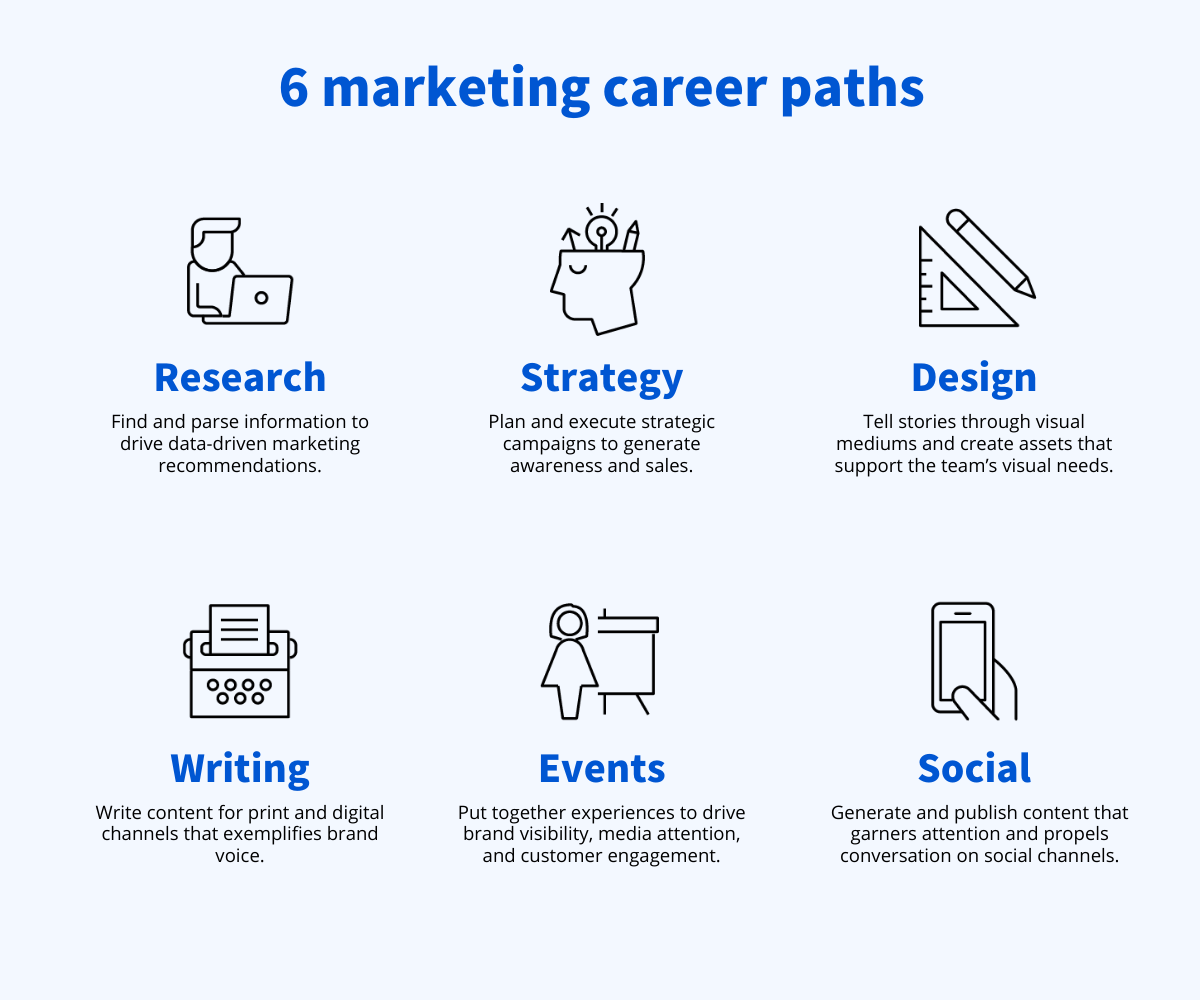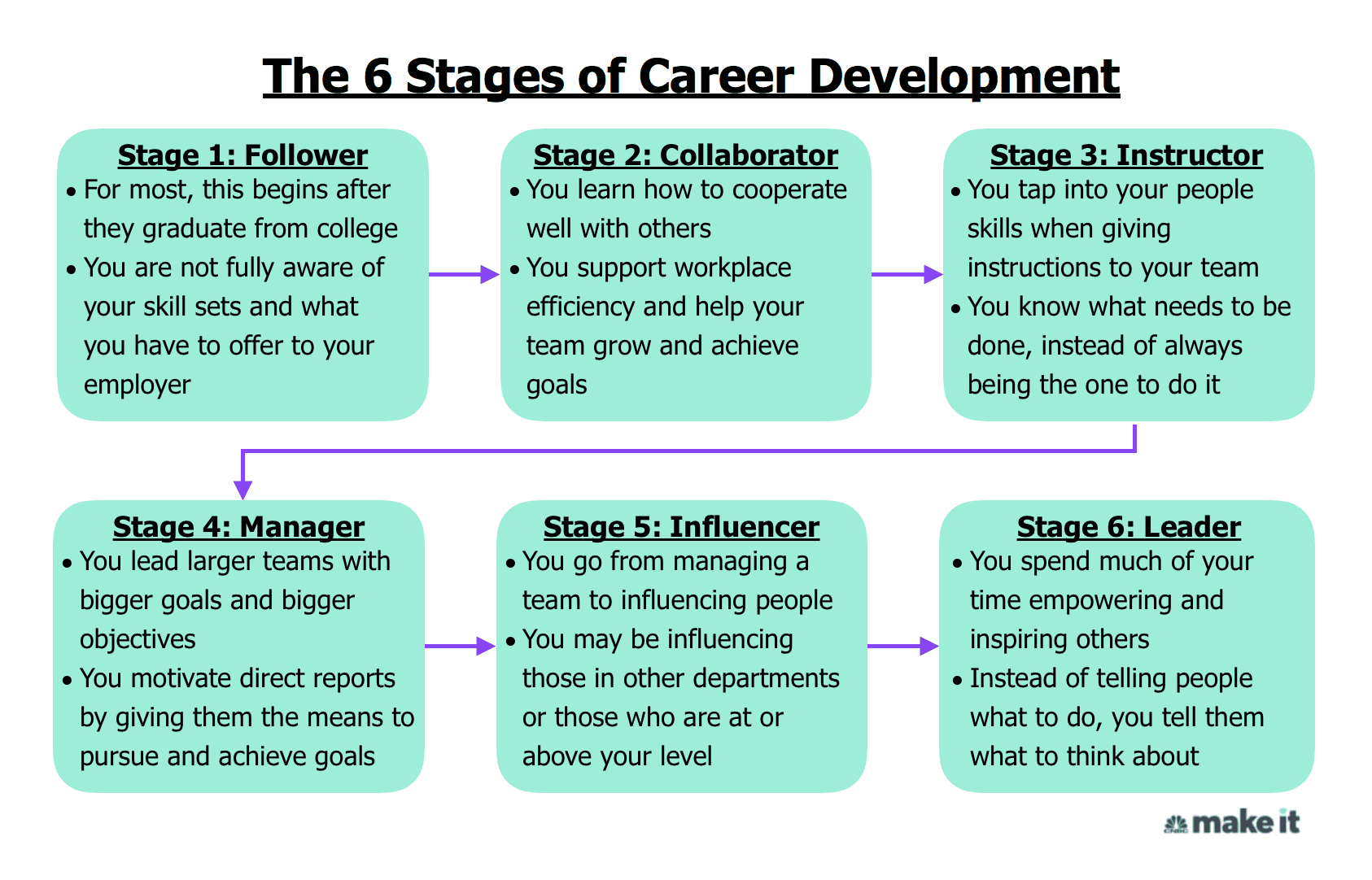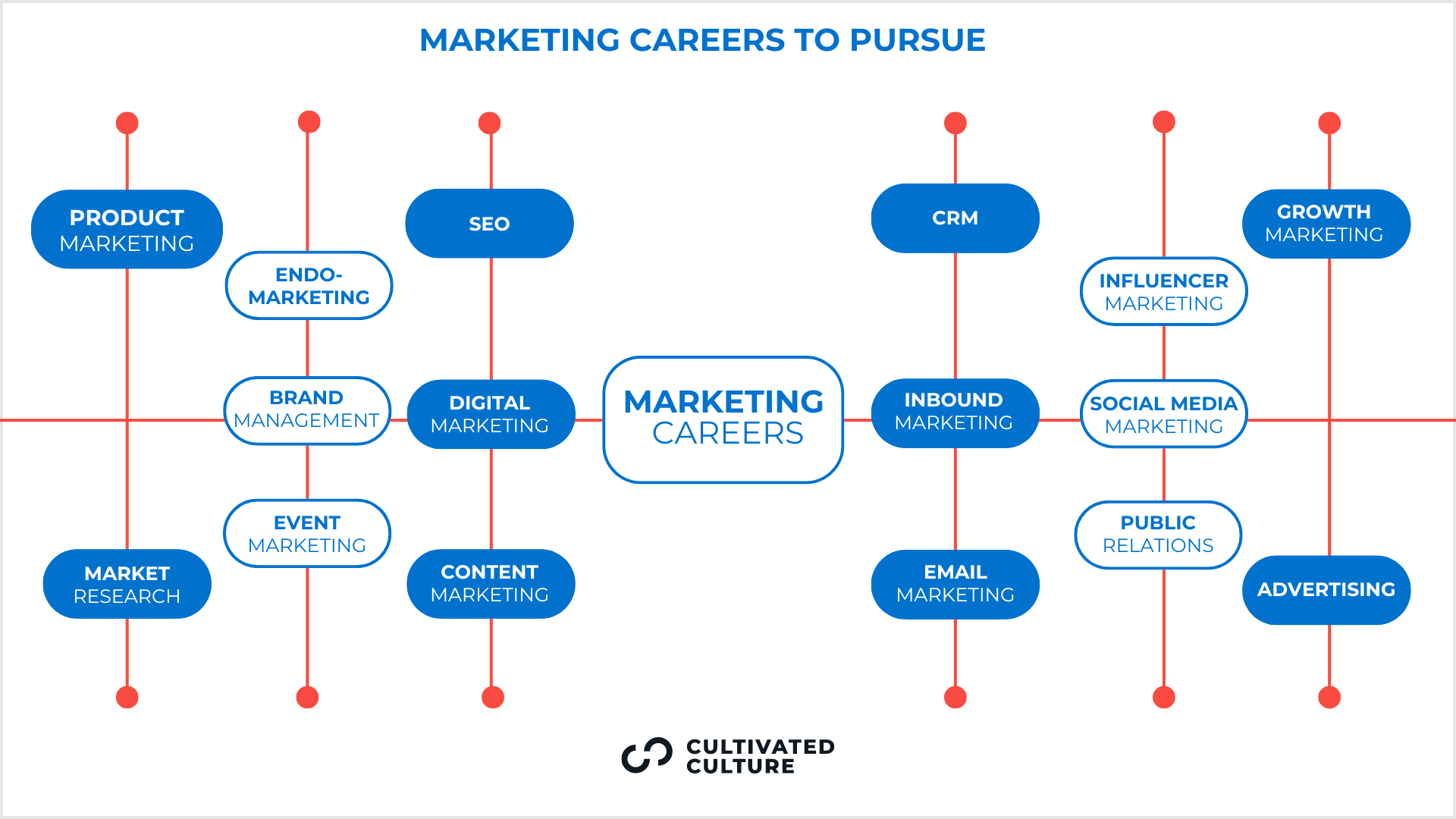A career in marketing offers a dynamic and evolving path, with opportunities spanning various industries and specializations. From entry-level roles to senior leadership positions, marketers can shape their trajectory based on skills, experience, and interests. Salaries in marketing vary widely, influenced by factors such as location, industry, and expertise. Entry-level marketers often start with competitive pay, while seasoned professionals in areas like digital marketing, data analytics, or brand management can command six-figure incomes. Understanding the potential career progression and earning potential is crucial for aspiring marketers aiming to navigate this fast-paced field and achieve long-term success.
What Does Your Career Trajectory and Salary Look Like as a Marketer?
1. Entry-Level Marketing Positions
At the beginning of your marketing career, you typically start in entry-level positions such as Marketing Coordinator, Social Media Specialist, or Content Writer. These roles often involve executing marketing strategies, managing social media accounts, and creating content. The average salary for entry-level marketers ranges from $40,000 to $55,000 annually, depending on the industry and location.
See Also Best Tradeshow Booth Vendors/Resources?
Best Tradeshow Booth Vendors/Resources?2. Mid-Level Marketing Roles
After gaining 3-5 years of experience, marketers often advance to mid-level roles like Marketing Manager, Digital Marketing Specialist, or SEO Analyst. These positions involve more strategic planning, team management, and data analysis. Salaries at this level typically range from $60,000 to $85,000 per year.
3. Senior-Level Marketing Positions
With 7-10 years of experience, marketers can reach senior-level positions such as Marketing Director, VP of Marketing, or Chief Marketing Officer (CMO). These roles focus on high-level strategy, budgeting, and leadership. Salaries for senior marketers can range from $100,000 to $200,000+, with additional bonuses and benefits.
See Also Online degrees - Best, fast and is it worth it?
Online degrees - Best, fast and is it worth it?4. Specialized Marketing Careers
Marketers can also specialize in areas like data analytics, SEO, content marketing, or email marketing. Specialized roles often command higher salaries due to their technical expertise. For example, a Data Analyst in Marketing can earn between $70,000 and $120,000, depending on their skills and experience.
5. Factors Influencing Salary and Career Growth
Several factors influence a marketer's salary and career trajectory, including industry, geographic location, education, and certifications. For instance, marketers in tech or finance industries tend to earn more than those in non-profits. Additionally, certifications like Google Ads or HubSpot can significantly boost earning potential.
See Also Which Books Will Actually Teach You Marketing?
Which Books Will Actually Teach You Marketing?| Career Stage | Average Salary | Key Roles |
|---|---|---|
| Entry-Level | $40,000 - $55,000 | Marketing Coordinator, Social Media Specialist |
| Mid-Level | $60,000 - $85,000 | Marketing Manager, Digital Marketing Specialist |
| Senior-Level | $100,000 - $200,000+ | Marketing Director, VP of Marketing, CMO |
| Specialized Roles | $70,000 - $120,000 | Data Analyst, SEO Specialist, Content Strategist |
What does a marketing career look like?

What Are the Key Roles in a Marketing Career?
A marketing career encompasses a variety of roles, each with distinct responsibilities. Here are some of the most common positions:
- Marketing Manager: Oversees campaigns, strategies, and team coordination to achieve business goals.
- Digital Marketing Specialist: Focuses on online channels like social media, SEO, and email marketing to drive engagement.
- Content Creator: Develops compelling content, including blogs, videos, and graphics, to attract and retain customers.
- Market Research Analyst: Analyzes data to understand consumer behavior and market trends.
- Brand Manager: Maintains and enhances the company's brand image through consistent messaging and campaigns.
What Skills Are Essential for a Marketing Career?
Success in marketing requires a blend of technical and soft skills. Below are the most critical ones:
- Communication: Ability to convey ideas clearly and persuasively across various platforms.
- Analytical Thinking: Proficiency in interpreting data to make informed decisions.
- Creativity: Developing innovative campaigns and solutions to stand out in a competitive market.
- Digital Literacy: Familiarity with tools like Google Analytics, CRM software, and social media platforms.
- Adaptability: Staying updated with industry trends and adjusting strategies accordingly.
What Are the Educational Requirements for a Marketing Career?
While educational paths can vary, most marketing roles require specific qualifications:
- Bachelor’s Degree: Typically in marketing, business, communications, or a related field.
- Certifications: Additional credentials like Google Ads or HubSpot certifications can enhance employability.
- Master’s Degree: Optional but beneficial for advanced roles, such as an MBA with a marketing focus.
- Internships: Practical experience through internships or entry-level positions is highly valued.
- Continuous Learning: Staying updated through workshops, online courses, and industry events.
What Are the Career Growth Opportunities in Marketing?
Marketing offers diverse opportunities for advancement and specialization:
- Entry-Level Roles: Positions like Marketing Assistant or Social Media Coordinator provide foundational experience.
- Mid-Level Roles: Roles such as Marketing Manager or Digital Strategist involve greater responsibility and leadership.
- Senior-Level Roles: Positions like Director of Marketing or Chief Marketing Officer (CMO) focus on strategic decision-making.
- Specialization: Opportunities to focus on areas like SEO, content marketing, or data analytics.
- Entrepreneurship: Many marketers transition to starting their own agencies or consulting businesses.
What Are the Challenges in a Marketing Career?
While rewarding, a marketing career comes with its own set of challenges:
- Keeping Up with Trends: The fast-paced nature of the industry requires constant learning and adaptation.
- Measuring ROI: Demonstrating the effectiveness of campaigns can be complex and data-intensive.
- Competition: High competition for roles and clients demands creativity and differentiation.
- Budget Constraints: Limited resources can restrict the scope of campaigns and strategies.
- Balancing Creativity and Strategy: Finding the right mix of innovative ideas and data-driven decisions is crucial.
How would you describe the trajectory of your career?

Early Career and Foundation
The trajectory of my career began with a strong focus on building a solid foundation. During this phase, I prioritized gaining essential skills and knowledge that would later serve as the backbone of my professional journey. Key highlights include:
- Education and Training: I pursued formal education and specialized training to develop expertise in my chosen field.
- Entry-Level Roles: I took on entry-level positions to gain hands-on experience and understand the industry dynamics.
- Networking: I actively built professional relationships to learn from mentors and peers.
Mid-Career Growth and Specialization
As I progressed, my career trajectory shifted toward growth and specialization. This phase was marked by taking on more challenging roles and refining my expertise. Key aspects include:
- Skill Enhancement: I focused on acquiring advanced skills and certifications to stay competitive.
- Leadership Roles: I transitioned into leadership positions, managing teams and driving projects to success.
- Industry Recognition: My contributions began to gain recognition, leading to opportunities for speaking engagements and collaborations.
Transition to Strategic Roles
In the later stages of my career, I moved into strategic roles that required a broader perspective and long-term planning. This phase involved:
- Strategic Decision-Making: I played a key role in shaping organizational strategies and policies.
- Mentorship: I dedicated time to mentoring younger professionals, sharing my experiences and insights.
- Innovation: I focused on driving innovation and adapting to industry changes to maintain relevance.
Challenges and Overcoming Obstacles
Throughout my career, I faced numerous challenges that tested my resilience and adaptability. Key challenges and how I overcame them include:
- Work-Life Balance: Balancing professional and personal commitments required careful time management and prioritization.
- Industry Shifts: Adapting to technological advancements and market changes demanded continuous learning.
- Setbacks: Overcoming failures and setbacks taught me valuable lessons in perseverance and problem-solving.
Future Aspirations and Goals
Looking ahead, my career trajectory is focused on achieving new milestones and contributing meaningfully to my field. My future goals include:
- Expanding Influence: I aim to take on roles that allow me to influence industry standards and practices.
- Lifelong Learning: I plan to continue learning and staying updated with emerging trends and technologies.
- Giving Back: I aspire to contribute to the community by supporting initiatives that promote education and professional development.
What is the career progression in marketing?
Entry-Level Positions in Marketing
Starting a career in marketing often begins with entry-level roles that provide foundational experience and skills. These positions are crucial for understanding the basics of marketing strategies and tools. Common entry-level roles include:
- Marketing Assistant: Supports marketing campaigns, manages schedules, and assists with administrative tasks.
- Social Media Coordinator: Manages social media accounts, creates content, and engages with followers.
- Market Research Analyst: Conducts research to understand market trends and consumer behavior.
Mid-Level Positions in Marketing
After gaining experience, professionals often move into mid-level roles that involve more responsibility and strategic planning. These positions require a deeper understanding of marketing principles and often involve managing teams or projects. Key mid-level roles include:
- Marketing Manager: Oversees marketing campaigns, manages budgets, and coordinates with other departments.
- Brand Manager: Develops and maintains the brand image, ensuring consistency across all marketing channels.
- Digital Marketing Specialist: Focuses on online marketing strategies, including SEO, PPC, and email marketing.
Senior-Level Positions in Marketing
Senior-level roles in marketing involve high-level strategy, decision-making, and leadership. These positions often require extensive experience and a proven track record of success. Common senior-level roles include:
- Marketing Director: Leads the marketing department, sets strategic goals, and oversees all marketing activities.
- Chief Marketing Officer (CMO): Responsible for the overall marketing strategy of the company, aligning it with business objectives.
- VP of Marketing: Works closely with the CMO to implement marketing strategies and manage large teams.
Specialized Roles in Marketing
Marketing professionals can also choose to specialize in specific areas, becoming experts in niche fields. These roles often require additional training or certifications. Examples of specialized roles include:
- Content Marketing Manager: Focuses on creating and distributing valuable content to attract and engage a target audience.
- SEO Specialist: Optimizes website content to improve search engine rankings and drive organic traffic.
- Product Marketing Manager: Works on the marketing strategy for specific products, from launch to market penetration.
Transitioning to Leadership Roles
For those aiming for leadership positions, transitioning from a specialized or senior role to a leadership role involves developing strong leadership and strategic skills. Key steps in this transition include:
- Building a Strong Network: Establishing connections within the industry can open doors to leadership opportunities.
- Gaining Cross-Functional Experience: Understanding different aspects of the business can prepare you for higher leadership roles.
- Continuous Learning: Staying updated with the latest marketing trends and technologies is crucial for effective leadership.
Is marketing a high paying career path?
What Factors Influence Marketing Salaries?
Marketing salaries can vary significantly based on several factors. These include:
- Experience: Entry-level marketers typically earn less than those with years of experience.
- Industry: Certain industries, such as technology and finance, tend to offer higher salaries for marketing roles.
- Location: Salaries are often higher in major cities or regions with a high cost of living.
- Specialization: Roles in digital marketing, data analytics, or SEO often command higher pay.
- Company Size: Larger corporations generally offer more competitive salaries compared to small businesses.
What Are the Highest-Paying Marketing Roles?
Some marketing roles are known for offering higher salaries due to their complexity and demand. These include:
- Chief Marketing Officer (CMO): A top-tier executive role responsible for overall marketing strategy.
- Digital Marketing Manager: Focuses on online campaigns and strategies, often requiring technical skills.
- Product Marketing Manager: Specializes in promoting specific products and aligning them with market needs.
- Data Analyst (Marketing): Uses data to drive marketing decisions and optimize campaigns.
- SEO/SEM Specialist: Experts in search engine optimization and marketing, crucial for online visibility.
How Does Education Impact Marketing Salaries?
Education plays a significant role in determining earning potential in marketing. Key points include:
- Advanced Degrees: A master’s degree in marketing or an MBA can lead to higher-paying roles.
- Certifications: Certifications in digital marketing, analytics, or specific tools (e.g., Google Ads) can boost salary prospects.
- Relevant Experience: Practical experience, such as internships or freelance work, often complements formal education.
- Continuous Learning: Staying updated with industry trends and technologies can enhance earning potential.
- Networking: Building professional connections can open doors to higher-paying opportunities.
What Are the Geographic Trends in Marketing Salaries?
Marketing salaries vary widely depending on geographic location. Important trends include:
- Urban vs. Rural: Urban areas, especially major cities, tend to offer higher salaries due to increased demand and competition.
- Global Markets: Countries with strong economies, such as the U.S., UK, and Germany, often pay more for marketing roles.
- Remote Work: The rise of remote work has allowed professionals to earn competitive salaries regardless of location.
- Cost of Living: Salaries are often adjusted to reflect the cost of living in a specific area.
- Emerging Markets: Rapidly growing economies may offer lucrative opportunities for experienced marketers.
What Skills Are Essential for High-Paying Marketing Careers?
To succeed in high-paying marketing roles, certain skills are crucial. These include:
- Data Analysis: The ability to interpret and leverage data is highly valued in modern marketing.
- Digital Proficiency: Expertise in digital tools, platforms, and strategies is essential.
- Creativity: Innovative thinking helps in crafting compelling campaigns and strategies.
- Communication: Strong written and verbal communication skills are vital for collaboration and client interaction.
- Leadership: Managing teams and projects effectively can lead to higher-paying managerial roles.
Frequently Asked Questions (FAQ)
What factors influence a marketer's career trajectory?
A marketer's career trajectory is influenced by several key factors, including education, experience, industry specialization, and networking. Entry-level marketers often start in roles like marketing coordinators or assistants, where they gain foundational skills. Over time, performance, leadership abilities, and strategic thinking can lead to promotions to roles such as marketing managers, directors, or even CMOs. Additionally, staying updated with digital marketing trends and obtaining certifications can significantly enhance career growth.
What is the average salary range for marketers at different career stages?
The salary range for marketers varies widely depending on their experience level and geographic location. Entry-level marketers typically earn between $40,000 and $60,000 annually. Mid-level professionals, such as marketing managers, can expect salaries ranging from $70,000 to $100,000. Senior-level marketers, including directors and VPs, often earn between $120,000 and $200,000, while Chief Marketing Officers (CMOs) can command salaries exceeding $250,000, especially in larger organizations or competitive industries.
How does specialization impact a marketer's career and earnings?
Specialization plays a crucial role in shaping a marketer's career and earnings. Marketers who focus on high-demand areas like digital marketing, data analytics, or content strategy often have better job prospects and higher earning potential. For example, a digital marketing specialist with expertise in SEO or paid advertising may earn significantly more than a generalist. Additionally, industries such as technology, healthcare, and finance tend to offer higher salaries for specialized marketing roles.
What are the long-term career growth opportunities for marketers?
Long-term career growth for marketers can include advancing to executive positions like CMO or transitioning into related fields such as business development or entrepreneurship. Many marketers also choose to specialize further, becoming experts in areas like brand management or customer experience. Additionally, some marketers pursue consulting or freelancing, offering their expertise to multiple clients. Continuous learning and adapting to industry trends are essential for sustained career growth in this dynamic field.
Leave a Reply



Articles of interest